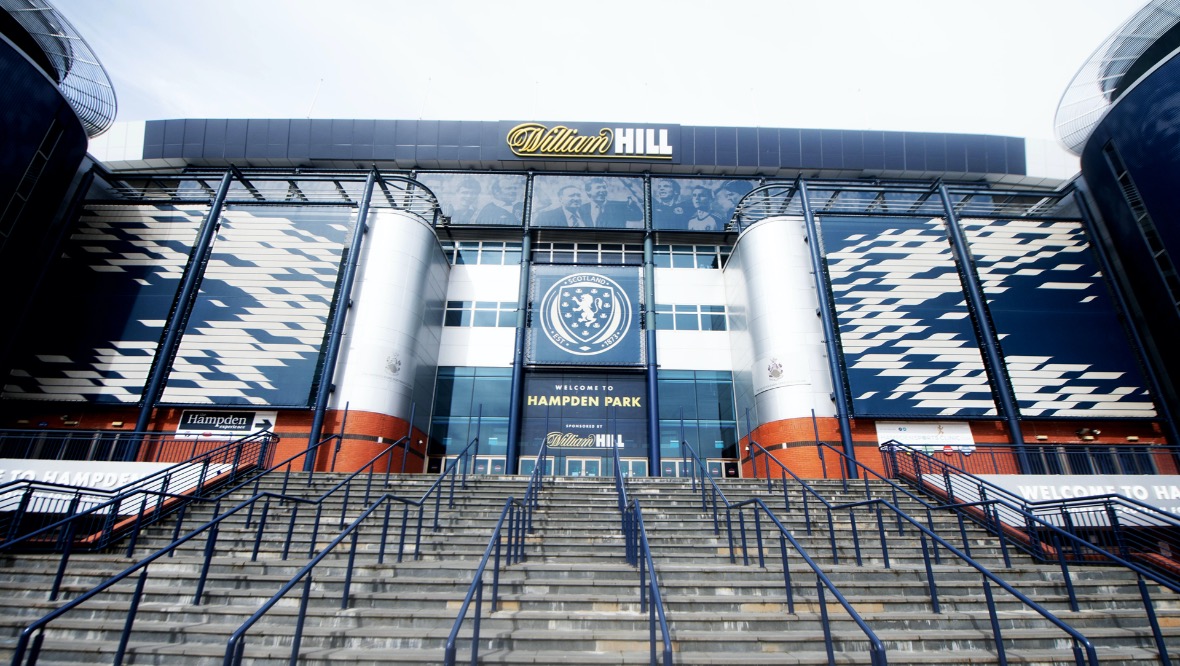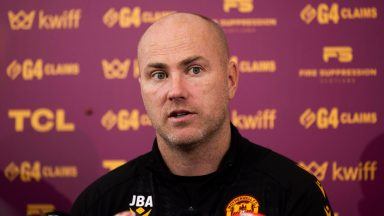It took until December but coronavirus finally got its first Premiership points on the board this week.
The league table shows nine goals scored and none conceded, but no right-minded supporter would have celebrated any of the process that brought the SPFL to award three games by forfeit.
At disciplinary hearings to investigate the coronavirus outbreak that led the clubs to postpone games, Kilmarnock saw their outstanding fixture against Motherwell marked down as a 3-0 defeat, while St Mirren forfeited their match against the Fir Park side and also saw three points given to Hamilton.
Both sides were also fined for failing to follow rules on Covid-19 protocols, though the penalties are suspended, pending any further breaches this season.
As you might expect, the awarding of nine points makes a difference to the league table, with Hamilton drawing level with St Mirren at the foot of the Premiership and Motherwell jumping from eighth to fifth.
Premiership managers expressed surprise at the severity of the punishments and Motherwell boss Stephen Robinson said he had sympathy for the two clubs involved, even though his side had benefited.
St Mirren made their disappointment known and Kilmarnock were more explicit, saying they felt “aggrieved”.
The Rugby Park side had admitted to technical breaches but felt they had made a strong case about their conduct and efforts. They also highlighted one of the crucial aspects of the affair – that once again there’s division and acrimony when Scottish football could be better served with a unified approach.
Scottish football being Scottish football, the moment the verdict was announced, comparisons were being made with other breaches and outbreaks and how they were handled.
Kilmarnock and St Mirren are not the first clubs to be charged under the rules, of course. Boli Bolingoli and the Aberdeen eight saw Celtic and the Dons fined, though they escaped further punishment because the players’ transgressions happened when outwith the club’s control.
Rangers duo Jordan Jones and George Edmundson received huge bans from the Scottish FA for holding a party and disregarding lockdown rules, but the league took no action because it didn’t affect a football match.
And clubs up and down the country have had positive Covid cases and outbreaks, but the scale has meant they haven’t drawn the attention of the Hampden authorities.
The league had laid down strict rules to help prevent the spread of the virus, and to help football continue, but it only polices the game in certain circumstances.
There are no spot checks to test if clubs have the right protocols in place, though clubs have had a visit from an SFA rep. And an SPFL delegate can report on matchday arrangements.
Unless a club asks for a postponement or says it can’t play, there’s no investigation, with clubs only falling foul if they threaten the fixture list.
If that happens, once charged with breaching the new Covid regulations, clubs enter the SPFL disciplinary process. The league has twice asked for, and twice been denied, the power to automatically award a 3-0 score against any club who can’t fulfil a fixture.
Without the fixed penalty, which is in place for the Betfred Cup, the SPFL convene a sub-committee and hear each case on its merits.
Unlike the Scottish FA, where a compliance officer decides if a case is worth bringing and the punishment for each specific offence is clearly known beforehand, the SPFL has far more scope. There are no specified sanctions, allowing a flexibility to be as severe or as lenient as they wish.
That’s why it’s surprising that an organisation whose primary purpose is to facilitate the playing of competitive matches would be so keen to decide the results without a ball being kicked.
At a time when clubs are facing unimaginable challenge, it’s hard for supporters to understand why their clubs could be hit so hard.
If there were wronged parties who needed compensated then perhaps it would be easier to make the case for forfeits. Motherwell and Hamilton were undoubtedly inconvenienced, but it’s a stretch to see them as injured parties. Postponements are part of Scottish football, as Mother Nature will undoubtedly show in the next few months.
The stress on the fixture list is well known, with four domestic competitions (including the final of last season’s Scottish Cup) to be played to conclusion and less time to fit it all in. The SPFL rightly fear a repeat of last season, where ending the leagues early brought bitter infighting and court dates.
Regardless, it’s not clear why every effort isn’t made to reschedule the games before taking the drastic step of a forfeit. Motherwell and Kilmarnock are both out of the League Cup and could have caught up within a fortnight.
St Mirren already have one ‘game in hand’ to be rescheduled and two more might have put strain on. If the fine both clubs received can be suspended until the end of the season, then why not the forfeit?
Neither club would likely argue if they were told that they faced a points deduction for any further breach, swerved if they could fulfil their fixtures.
The current situation gives the appearance that severe punishment is being handed out because the rule breaches messed with the administration of the league.
Kilmarnock’s statement started with the simple declaration that “the health and safety of our staff and players has always been and remains our first priority”.
The same applies to all 42 clubs. Everyone is taking precautions to prevent the spread of a serious virus and the added threat of an SPFL punishment on top of that is an insignificant and unnecessary addition.
Some clubs will fail to prevent an outbreak despite best efforts or because of mistakes along the way. When the SFA, the organisation with a leadership role and responsible for providing guidance, can’t prevent an outbreak that saw Under-21 stars returned to their clubs carrying the virus and ended up with the women’s national team head coach missing crucial qualifiers through self-isolation, then questions have to be asked about what standards clubs are being asked to meet.
The fear of a 3-0 scoreline being awarded against them will not further incentivise clubs to try to keep people safe. But it might affect how they handle an outbreak if they do experience one.
Kilmarnock self-isolated as an entire squad on advice from their local health authority. Would other clubs take that advice later in the season when the ramifications of forfeit might be clearer? Would youth players be pressed into service to fulfil a fixture when it’s not best for their development?
No two cases are the same, as has already been seen, but it does appear like a precedent has been set and there will be more cases to come. Dundee United have nine players and their entire coaching staff self-isolating now but can play their game against Livingston this afternoon. Clyde are not so lucky and have had to request another postponement, and will face a hearing.
That scenario is likely to be repeated throughout the season, with a thin line between a club stepping up or calling off, based on squad size, advice and best practice.
The league table has already been impacted by the virus but a change in tack from those at the top could prevent the final standings from being marked even more significantly by the virus.


 SNS Group
SNS Group

























